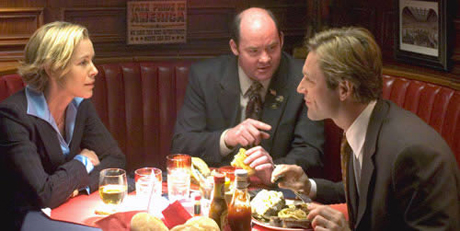« V for Vendetta (2006) – Movie Review | Home | United 93 (2006) – Movie Review »
Thank You for Smoking (2005) – Movie Review
By Robert L. Jones | April 14, 2006

Maria Bello, David Koechner, and Aaron Eckhart represent Alcohol, Tobacco and Firearms in Jason Reitman's debut movie, "Thank You for Smoking"
Reitman Lights Up the Screen
[xrr rating=4/5]
Thank You for Smoking. Starring Aaron Eckhart, Maria Bello, Cameron Bright, William H. Macy, David Koechner, J.K. Simmons, Rob Lowe, Katie Holmes, Sam Elliott, and Robert Duvall. Screenplay by Jason Reitman. Based on the novel by Christopher Buckley. Directed by Jason Reitman. (Fox Searchlight Pictures, 2005, Color, 92 minutes. MPAA Rating: R.)
“Michael Jordan plays ball. Charles Manson kills people. I talk.”
Thus are we introduced to the protagonist of Thank You for Smoking—the chisel-chinned, smooth-talking Nick Naylor (Aaron Eckhart), who relishes the daily, daunting challenges presented by his thankless job as lobbyist for Big Tobacco.
Turning a withering eye on Washington pressure-group politics, Thank You for Smoking is an intelligent comedy whose laughs come frequently and naturally. Amidst today’s predictable, mindless comedies and manipulative PC “message” movies, director Jason Reitman’s first feature-length film is a breath of fresh air—albeit suddenly engulfed by that heavy cloud emanating from the Camel held casually between a chain-smoker’s yellowing fingertips. And thanks to Reitman’s adroit direction and insistence on faithfully adapting novelist Christopher Buckley’s black comedy to the screen, Nick Naylor has been winning over audiences with his upbeat, audacious portrayal of “the Sultan of Spin.”
The film opens with a TV segment from the syndicated Joan Lunden Show, where Naylor finds himself the lone spokesman for cigarettes, and pitted against a stacked panel of governmental and non-profit agency health officials. To make matters worse, he’s seated right next to a teenaged victim of tobacco—bald chemo head, hopeless facial expression, and all. Confronted by a bureaucrat about Cancer Boy’s impending demise, by the charge that tobacco companies are profiting off children’s deaths, and by a hostile, booing audience, Naylor appears to be painted into a corner. But instead of backing down and conceding, the supremely self-confident spokesman suavely seizes the offensive:
How on earth would Big Tobacco profit off of the loss of this young man? I hate to think in such callous terms, but if anything, we’d be losing a customer. It’s not only our hope. It’s in our best interest to keep Robin alive and smoking.
By the program’s end, Naylor not only has turned the audience in his favor, he’s even won over Cancer Boy.
An amoralist who can deftly swing any argument in his favor, Naylor tries to justify himself to his intelligent and inquisitive son, Joey (Cameron Bright). “My job requires a certain…moral flexibility.” He’s a working-class guy who loves his work and prides himself for getting ahead in life through his debating skills alone: “I don’t have an M.D. or law degree. I have a Bachelor’s in kicking ass and taking names.” His latest mission: to get smoking back into movies—and to put the sex back into smoking.
Though some viewers may regard Naylor as morally repugnant, I think they’re missing the point: This is a comedy, people, not a sermon. The scoundrel-as-hero is a time-honored device in motion pictures that deal with the theme of liberty versus repression. Think of Melvyn Douglas’s parasite playboy, Count Leon d’Algout, in Ernst Lubitsch’s 1939 anti-communist farce, Ninotchka—or Jimmy Cagney’s boisterous, “ugly American” Coca-Cola exec in Billy Wilder’s 1961 Berlin Wall satire, One, Two, Three —or, more recently, Laura Dern’s trailer-trash paint huffer, Ruth Stoops, inCitizen Ruth, Alexander Payne’s 1996 skewering of pro-life and pro-choice movement zealots. Nick Naylor belongs in the same august company as these celluloid rogues.
A high point in the movie’s hilarity takes place when Nick lunches at an old, oak-paneled club with a couple of fellow lobbyists: Polly Bailey (played smart and sultry by the lovely Maria Bello), who fronts for the liquor industry, and Bobby Jay Bliss (David Koechner, at his good-ol’-boy best), who represents an NRA-like gun group. It’s a gut-busting scene in which the three—who unofficially refer to themselves by the morbid label “the MOD squad” (Merchants Of Death)—heatedly debate whose industry can take credit for more deaths. Watching Nick beam proudly while Polly and Bobby Jay sulk, because tobacco kills more than booze and guns combined, is simply priceless.
“This movie’s libertarian,” Reitman has said of its politics, noting that college students have been particularly receptive to its message: that even though big business can often be sleazy and manipulative, the alternative—intrusive and restrictive big government—is a far greater threat.
Here, big government is personified by the meddling PC-environmentalist-liberal Senator Ortolan K. Finisterre (typical Buckley wit—“Finisterre” is a French compound word meaning “end of the world”), played priggishly puritanical by gifted character actor William H. Macy. Finisterre won’t rest until a skull-and-crossbones label is emblazoned on every pack of cigarettes sold in the U.S., because—although most Americans know smoking is bad for them by reading the Surgeon General’s warning—current labeling discriminates against the illiterate and non-English speaking!
Naylor’s appearance before the senator’s rigged subcommittee hearing is a gem that spotlights the real issue at stake: not whether cigarette smoking is harmful, but whether people have the right to choose to use that harmful product. For just a moment, the movie turns serious as Naylor summons what integrity he has left to defend his industry’s right to sell its products, and consumers’ rights to think and choose for themselves. It’s a stirring, unambiguous defense of liberty that one seldom encounters in today’s culture, especially in Hollywood.
With a light touch, Reitman draws great performances from a stellar supporting cast: Rob Lowe as pretentious and unctuous Hollywood mega-agent Jeff Megall; the kittenish Katie Holmes as ambitious investigative journalist Heather Holloway, who comes on to Nick like catnip and ends up using him as a scratching post; J.K. Simmons as Nick’s gruff boss, B.R., who barks four-letter words at his staff; Sam Elliott as the ex-Marlboro Man, now quietly, bitterly dying of emphysema; and Robert Duvall as “the Captain,” the last great Southern-gentleman tobacco baron, who takes Nick under his wing and teaches him the secret of making a perfect mint julep.
The result is that rare serious movie you don’t have to take too seriously. With this, his feature-film directorial debut, Jason Reitman has proven himself already the comedic equal of his father, director Ivan Reitman (Stripes, Ghostbusters, Kindergarten Cop). Full of dry wit and hysterical satire, intellectually stimulating and highly entertaining—but never heavy-handed—Thank You for Smoking is one of the best comedies I’ve seen in years.
Robert L. Jones is a photojournalist living and working in Minnesota. His work has appeared in Black & White Magazine, Entrepreneur, Hoy! New York, the New York Post, RCA Victor (Japan), Scene in San Antonio, Spirit Magazine (Canada), Top Producer, and the Trenton Times. Mr. Jones is a past entertainment editor of The New Individualist.
Topics: Black Comedies, Comedies, Independent Films, Movie Reviews | Comments Off on Thank You for Smoking (2005) – Movie Review
